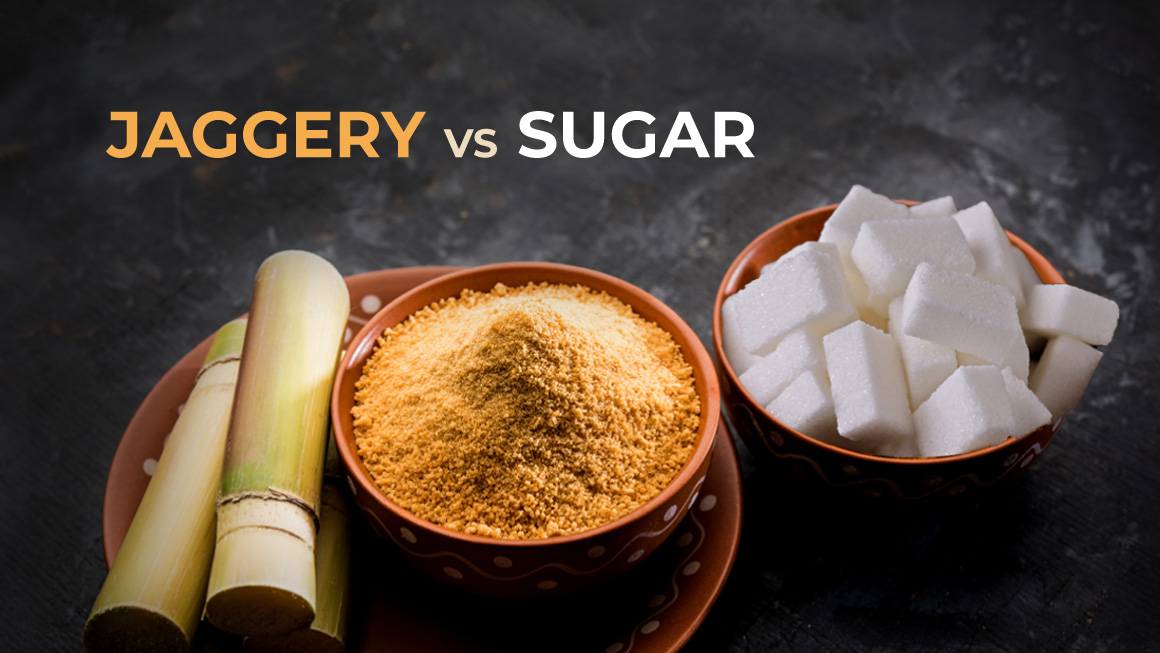Jaggery vs Sugar
Difference between Jaggery and Sugar
Have you ever wondered what the difference is between jaggery and sugar? We certainly have! With more and more people looking for healthier food options, it can be tough to make the right decisions. Join us on our exploration of jaggery vs sugar as we compare their health benefits, effects, and calories. You might just be surprised by what we find out!
That’s why we decided to look into the details of both foods so we could make up our own minds about them.
What Is Jaggery?
A natural sweetener also known as gur, it’s an unrefined form of sugar that’s made from evaporated sugarcane juice or date palm sap and is full of minerals that get lost in the refining process. It looks like a golden-hued block and has a distinct flavor that’s slightly smoky with notes of caramel and molasses.
Jaggery is often used in Indian desserts, but it’s gaining popularity around the world as a nutritious sweetener. Not only does it have more than twice the calories of white sugar, it has a far richer nutrient profile as well.
Its unique combination of sucrose and other sugars are full of vitamins and minerals such as calcium, potassium, magnesium, iron, zinc and selenium which help fortify your body. And its complex flavor offers an interesting twist on drinks like coffee or tea—or even savory dishes like curries!
How Does It Differ From Sugar?
First off, let’s talk about calories: one teaspoon of jaggery contains 17 calories, while the same amount of sugar contains 16. So jaggery isn’t necessarily lower in calories than sugar. But here’s where it stands out—it has more minerals and antioxidants than regular table sugar.
Jaggery does not have any unhealthy additives or artificial colors—it is made from crushed-up raw cane or date palm sap, which helps retain all its natural nutrients. On the other hand, table sugar involves a heating process that destroys most of its vitamins and minerals.
This makes jaggery an ideal option for natural sweetening in many dishes such as desserts and beverages. Plus, some studies suggest that moderate consumption can even help prevent oxidative damage to cells and boost immunity!
Benefits of Jaggery Over Sugar
You may not know it, but there are plenty of benefits to using jaggery over sugar! Not only is it just as sweet, but it also has some incredible health benefits that you won’t find in conventional refined sugar.
Nutrient Content
Jaggery is significantly richer in minerals than refined sugar, so it’s definitely a better option for your health. It boasts nutrients like calcium, phosphorus, iron and magnesium—all of which are great for your bones and your overall health.
Dietary Fiber
Jaggery also contains noticeable amounts of dietary fiber, which isn’t found in regular sugar! This makes it a much better addition to your diet as it will support your digestion – as well as helping to control your cholesterol levels.
Glycemic Index
Sugar has a glycemic index of 60-65, while jaggery is a lot lower at about 40-50. This means that when baking or cooking with jaggery (instead of regular sugar), you can still keep blood glucose levels from spiking—which ultimately gives you the same sweet taste without any health risks.
So, you now know the differences between jaggery vs sugar: the health benefits, effects, and calories. Based on your preferences and needs, you may find one type of sweetener more appealing than the other. In either case, make sure to purchase quality products from reputable websites or stores to ensure safety and quality assurance.
Conclusion
Whether you’re looking for a healthier alternative to sugar, or simply want to explore what jaggery has to offer, it’s important to understand the differences between the two sweeteners.
The health benefits of jaggery include a lower glycemic index than that of sugar, as well as a better source of minerals, making it a great choice. Furthermore, most jaggery products do not contain additives which makes it a healthier option. And don’t forget to always consume jaggery or sugar in moderation!

